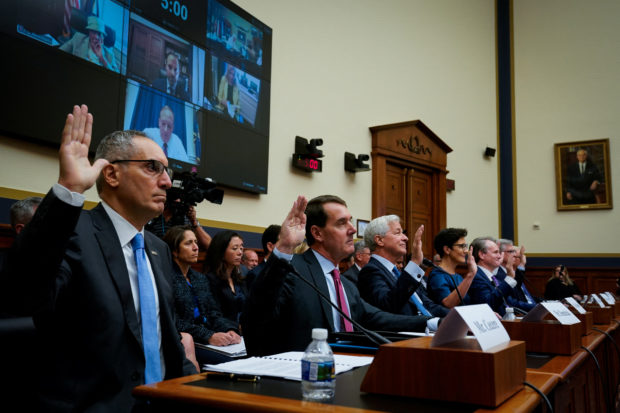
U.S. Bancorp President and CEO Andy Cecere, PNC Financial Services Group President and CEO William Demchak, JPMorgan Chase & Co President and CEO Jamie Dimon, Citigroup CEO Jane Fraser, Bank of America Chairman and CEO Brian Moynihan, Truist Financial Corporation Chairman and CEO William Rogers Jr., and Wells Fargo & Company President and CEO Charles Scharf swear in at the start of a U.S. House Financial Services Committee hearing titled “Holding Megabanks Accountable: Oversight of America’s Largest Consumer Facing Banks” on Capitol Hill in Washington, U.S., September 21, 2022. REUTERS/Elizabeth Frantz
WASHINGTON – Top U.S. bankers came under pressure from lawmakers on Wednesday to take a tougher stance on doing business with China amid growing tensions between Washington and Beijing over Taiwan’s sovereignty and China’s human rights record.
During a hearing before the U.S. House Financial Services Committee, Republican congressman Blaine Luetkemeyer pressed bank chief executives on how they would respond in the hypothetical event of a Chinese invasion of Taiwan.
Lawmakers also asked the CEOs to condemn China’s “human rights abuses,” in a departure from previous hearings that tended to focus on domestic issues like housing and consumer protection.
“We will follow the government’s guidance, which has been for decades to work with China,” said Bank of America Chief Executive Officer Brian Moynihan. “If they change that position, we will immediately change it, as we did in Russia.”
JPMorgan & Chase CEO Jamie Dimon and Citigroup CEO Jane Fraser both concurred, saying their banks would follow government guidance if China were to invade Taiwan.
The increased scrutiny underscores the challenges the country’s largest lenders increasingly face as they try to balance commercial interests with pressure from policymakers, activists and investors to take stances on environmental, social and governance issues.
Wall Street giants including JPMorgan, Goldman Sachs Group Inc and Morgan Stanley have sought in recent years to expand their businesses in China, the world’s second-largest economy. Authorities there have granted U.S. banks more ownership of their securities businesses despite rising geopolitical tension and economic competition between the two nations.
JPMorgan, which has been in China since 1921, serves Chinese and international corporations, financial institutions and government agencies. Last year it became the first foreign firm to fully own a securities venture in China.
Citigroup, which was the first U.S. bank to set up shop in China in 1902, last year applied for a mainland Chinese securities license as part of its push to ramp up business in the market.
China has been carrying out military drills near Taiwan in recent weeks. After U.S. House Speaker Nancy Pelosi visited Taipei, China fired missiles into waters near the island, though its activities have since scaled back.
China claims democratically ruled Taiwan as its own territory. Taiwan’s government rejects China’s sovereignty claims.
Congressman Luetkemeyer asked Fraser what Citigroup would do if a war over Taiwan broke out.
“It’s a hypothetical question,” Fraser said. “It’s highly likely that we will have a reduced presence.” Citigroup has a global reach that spans more than 160 countries.
When asked later by Republican Lance Gooden if she would condemn “ongoing human rights abuses in China,” Fraser hesitated. “Condemn is a strong word,” she said. “We certainly are very distressed to see it.”
JPMorgan’s Dimon also warned the United States had to compete with global Chinese banks, which have grown in size over the last few years to become the biggest in the world.
“I am going to do everything in my power to make sure we compete with the best Chinese banks in the world. It is very important for the future of America that America maintains its financial supremacy just like anything else.”